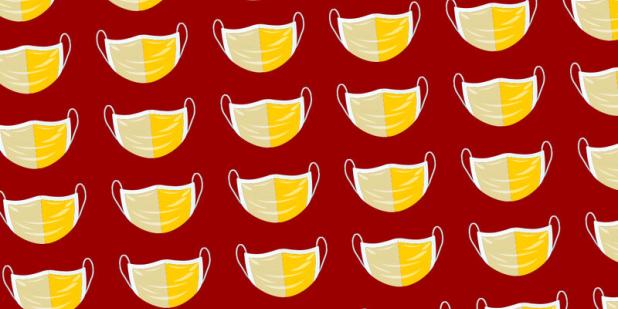Join us for a free one-day workshop for educators at the Japanese American National Museum, hosted by the USC U.S.-China Institute and the National Consortium for Teaching about Asia. This workshop will include a guided tour of the beloved exhibition Common Ground: The Heart of Community, slated to close permanently in January 2025. Following the tour, learn strategies for engaging students in the primary source artifacts, images, and documents found in JANM’s vast collection and discover classroom-ready resources to support teaching and learning about the Japanese American experience.
Alumni donate 8,000 masks to help shield USC health care workers from COVID-19
Chinese alumni procured and donated thousands of surgical masks to USC health workers on the frontlines of the coronavirus pandemic. Originally published by USC Dornsife. Written by Margaret Crable.

As hospitals in Los Angeles County began preparing for the first wave of COVID-19 patients earlier this year, they grappled with an extreme shortage in personal protective equipment, or PPE.
Skyrocketing demand, dwindling overseas suppliers and competition between states, rather than an organized procurement effort led by the federal government, had made PPE exceedingly scarce. The medical grade masks health care workers require were in particularly short supply.
When the university requested donations of PPE for USC clinics, the Trojan Family was ready to help.
Alumni hear the call
Shang Song, who graduated in 1996 from USC Dornsife College of Letters, Arts and Science with a Ph.D. in physics, and Ni Nadine Ding ’90, a chemistry alumna, were already experienced in hunting down the elusive and pricey medical grade masks. Song bought masks for her family to use but soon discovered a larger need in her community of Morristown, New Jersey. Ding, a scientist with Abbott Vascular Device, knew the right channel to purchase authentic medical PPEs.
“I realized that hospitals, nursing homes, firefighters and police were all desperately in need of PPE, as well,” Song said. She, Ding and other USC alumni, who kept in touch through the WeChat social media platform, reached out to their personal connections to import masks from China. Shortly thereafter, she found out about a drive to raise funds to purchase masks for USC health workers, spearheaded by USC’s Jincai Chang.
Chang, associate professor of MFD chemical engineering and materials Science with the USC Viterbi School of Engineering, received a request from the university asking campus science labs to donate personal protective equipment to USC hospital facilities.
Chang, who earned his Ph.D. at USC, and his colleagues gathered what they could from their own labs, but much more PPEs were needed for the school. Eager to pitch in more, he asked help from his alumni group on WeChat.
“I got an overwhelming response,” said Chang. Money poured in to help purchase masks, with Chang’s call ultimately raising $5,600, enough to purchase 8,000 surgical masks.
Chang felt inspired by his fellow Trojans’ generosity, though a little shocked at the cost of the precious, high-quality medical grade masks. “This was probably 10 times more expensive than usual,” he said. Still, with the hard work of Song and Ding, the group was lucky to get that price — the state of Kentucky at one point paid $8,600 for just 1,000 masks.
Mask hunters
Song, Ding and 24 other alumni friends were key to the acquisition of PPE. Native to mainland China, they had direct connections to suppliers and exporters in the country, where a majority of masks were manufactured.
“When the USC initiative started, I had already gone through a few of these transactions, so I just added onto the order,” Song said.
That didn’t mean the task was simple. “The most difficult part was just getting the right mask. There’s a lot of difference in quality and quantity. You have to find the right channel. You can’t just walk into a store and buy it directly. Ding and Song’s experience and expertise helped greatly,” says Chang. The fight for masks has become so contentious that some buyers in the U.S. have required codewords from manufacturers to ensure masks are legitimate.
Trojan gratitude
Tracking down thousands of masks in the middle of a pandemic wasn’t the simplest feat, but Song is just grateful to have an opportunity to give back to USC.
“We’re all from mainland China. When we came to the United States, USC was our first stop. We’re very thankful for not only the education we received from USC, but also the financial support we received through scholarships and research assistant positions,” said Song. “When, many years later, Dr. Chang suggested we give back, we all said, ‘Let’s do that.’”
Featured Articles
Please join us for the Grad Mixer! Hosted by USC Annenberg Office of International Affairs, Enjoy food, drink and conversation with fellow students across USC Annenberg. Graduate students from any field are welcome to join, so it is a great opportunity to meet fellow students with IR/foreign policy-related research topics and interests.
RSVP link: https://forms.gle/1zer188RE9dCS6Ho6
Events
Hosted by USC Annenberg Office of International Affairs, enjoy food, drink and conversation with fellow international students.
Join us for an in-person conversation on Thursday, November 7th at 4pm with author David M. Lampton as he discusses his new book, Living U.S.-China Relations: From Cold War to Cold War. The book examines the history of U.S.-China relations across eight U.S. presidential administrations.




